Slow responses from ChatGPT can be frustrating, especially when you need quick answers or insights. If you’re finding ChatGPT so slow, here are some immediate troubleshooting steps to help you get back to using it efficiently.
Why is ChatGPT so slow?
Several factors can contribute to ChatGPT’s response time, including server load, the complexity of your query, network latency, and backend processing times. During peak usage periods or system maintenance, you might experience slower responses.
High traffic and server overload
A significant reason for ChatGPT being slow is the high volume of users on the platform. Since its launch, the influx of users can sometimes overwhelm the servers, causing delays. This is a typical issue for many online services experiencing high traffic. If you find ChatGPT not working properly, it’s likely a temporary issue due to heavy usage.
Internet connection and device performance
If you find ChatGPT so slow, your internet connection or device might be to blame. A sluggish wifi or ethernet connection means your query takes longer to reach the server, resulting in delayed responses. Similarly, older devices may not have the necessary processing power to run ChatGPT smoothly, as it requires significant resources.
Account type limitations
Using a free ChatGPT account might result in slower response times compared to a paid account. Free accounts have limited bandwidth and resources, whereas paid subscriptions offer faster response times and access to additional features, improving the overall user experience.
VPN interference
VPNs can slow down ChatGPT’s performance. By encrypting your internet data and routing it through multiple servers, VPNs add latency to your connection, making ChatGPT so slow. Disabling your VPN might improve response times.
Browser cache and performance
An overloaded browser cache can make ChatGPT slow. While the cache helps speed up page loading times by storing temporary data, too much cached data can hinder performance. Clearing your browser cache regularly can help maintain optimal speed and performance.
Complexity of questions
The time it takes for ChatGPT to respond can vary depending on the complexity of the question. Generally, ChatGPT answers within a few seconds, but more complex or ambiguous questions can take longer. If ChatGPT struggles to interpret the question or lacks the necessary information, it may result in delayed responses.
How to make ChatGPT faster?
Experiencing slow responses from ChatGPT can be frustrating, especially when you’re looking for quick insights or answers. Here are some immediate troubleshooting steps to help you get back to using ChatGPT efficiently.
Refresh your session
One of the first steps to address ChatGPT so slow issues is to log out and log back in after a short period. If this doesn’t resolve the problem, try the following solutions.

Clear cache and cookies
If ChatGPT performance suddenly declines, it might be due to outdated cache data. Clearing your browser’s cache and cookies can often resolve unexpected behavior with web applications.
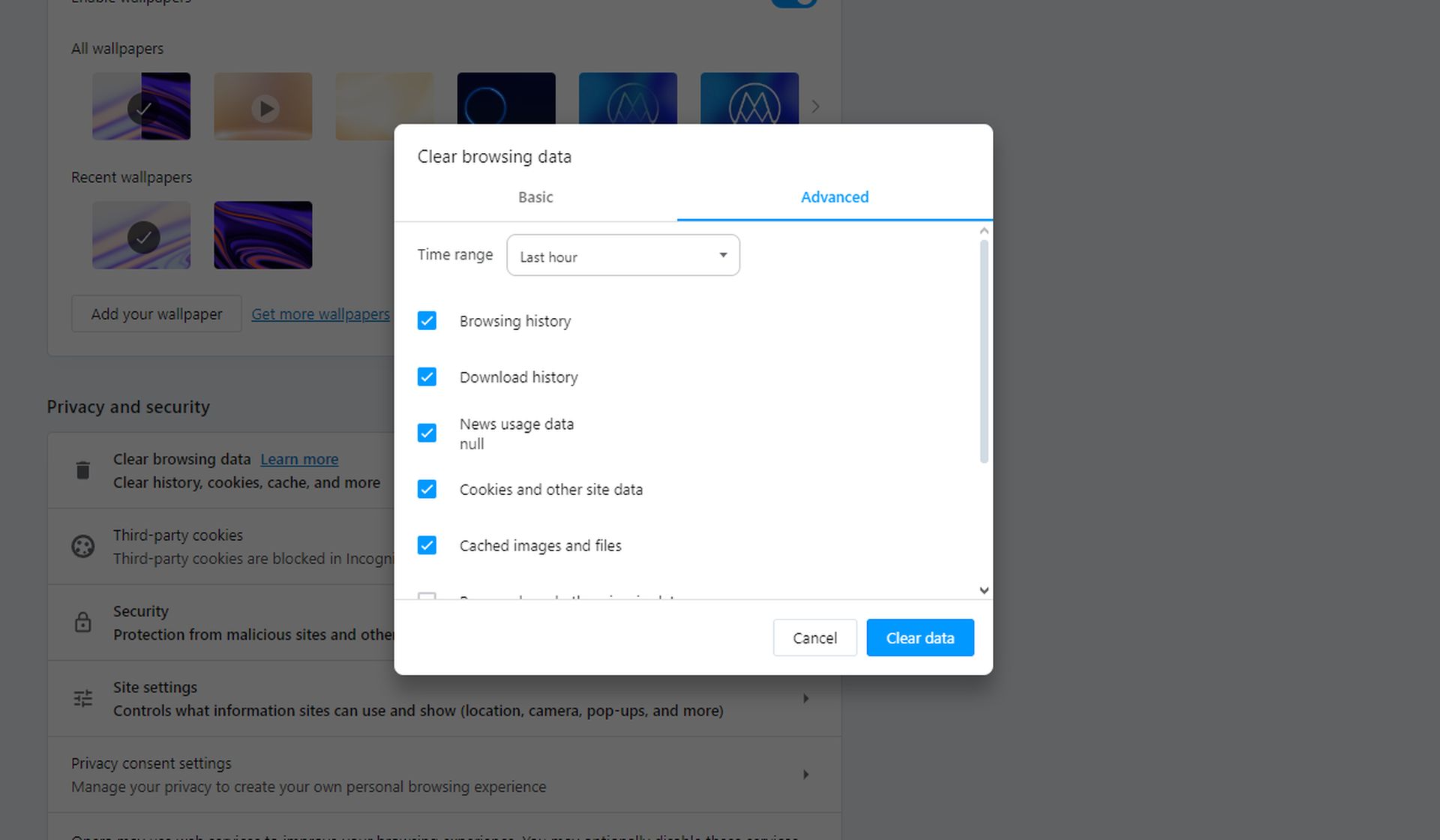
Monitor ChatGPT status
Users may notice a pattern of slowness during peak hours. Check OpenAI’s Status Page for any reported issues or maintenance activities that could affect response times.
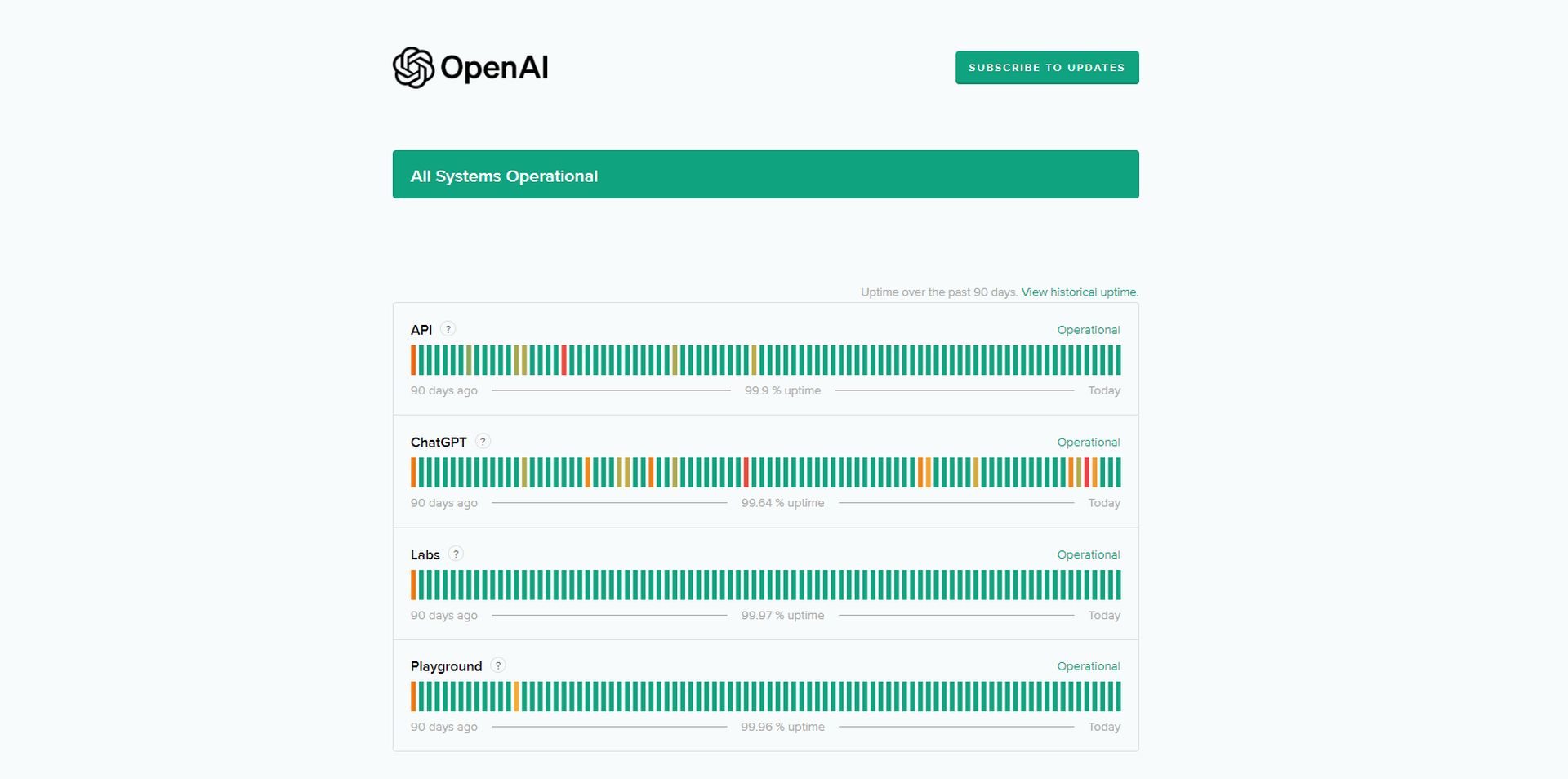
Switch browsers
Trying a different browser can help determine if the issue is specific to your current setup. Browser extensions can interfere with web applications, so disable extensions, especially those that block scripts or ads, to see if that resolves the issue. Additionally, closing unnecessary programs or tabs can free up system resources and improve your ChatGPT experience.
Change devices or networks
Check your internet connection speed using online speed test tools to see if the slowness is specific to ChatGPT. Network policies at your workplace or on your VPN can sometimes cause access issues. Consult your IT administrator if you suspect the network might be the problem.
Disable your VPN
VPNs can cause latency issues with tools like ChatGPT. Disabling your VPN can often improve response times.
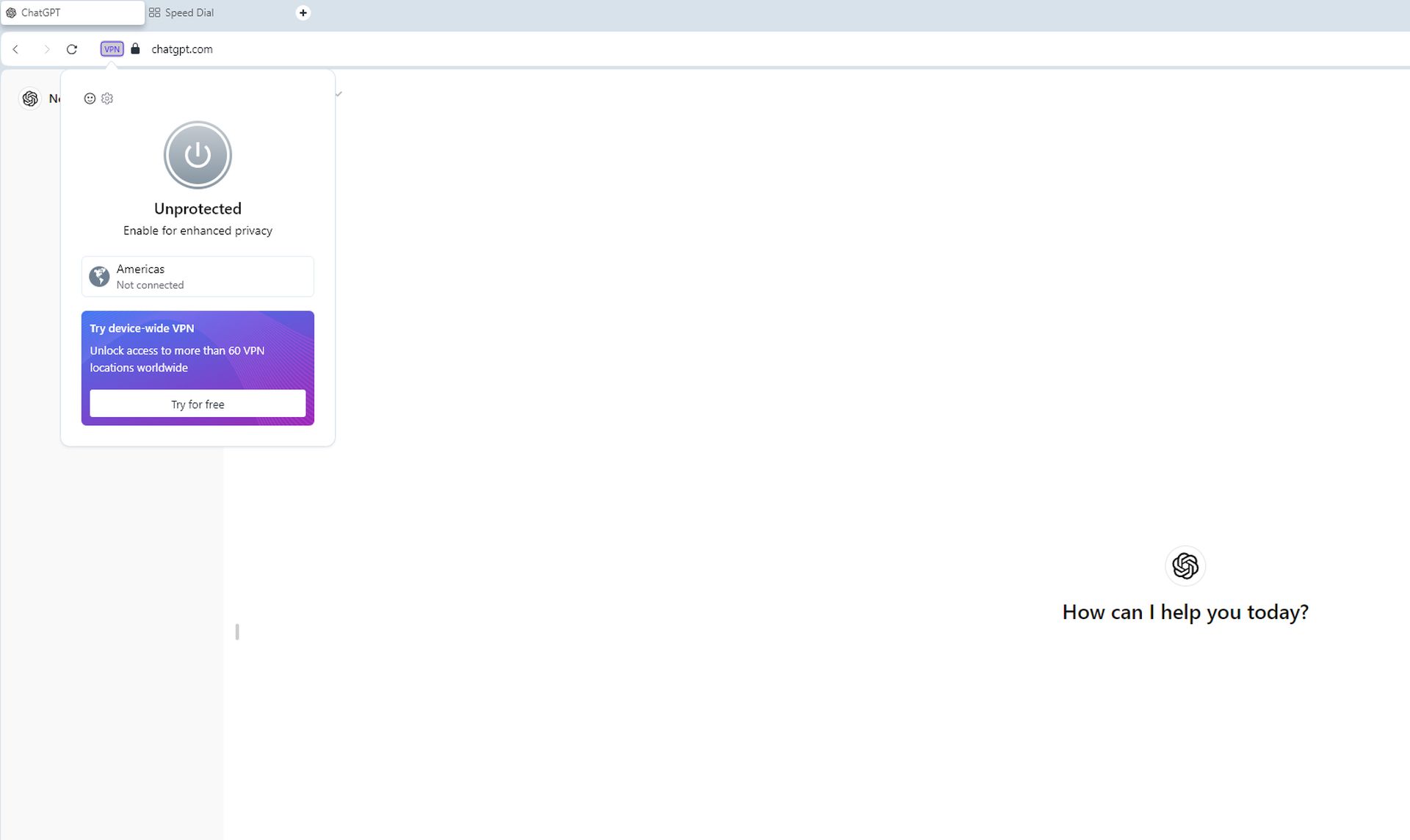
Try using a VPN
If you aren’t using a VPN, trying one might help as geographical factors can sometimes affect performance. However, be cautious as corporate or public VPNs can subtly interfere with the connection to ChatGPT’s servers. Popular VPN services connected to busy servers might trigger anti-spam measures or rate limiting, slowing down your interactions. For instance, you can try out Opera’s integrated VPN.
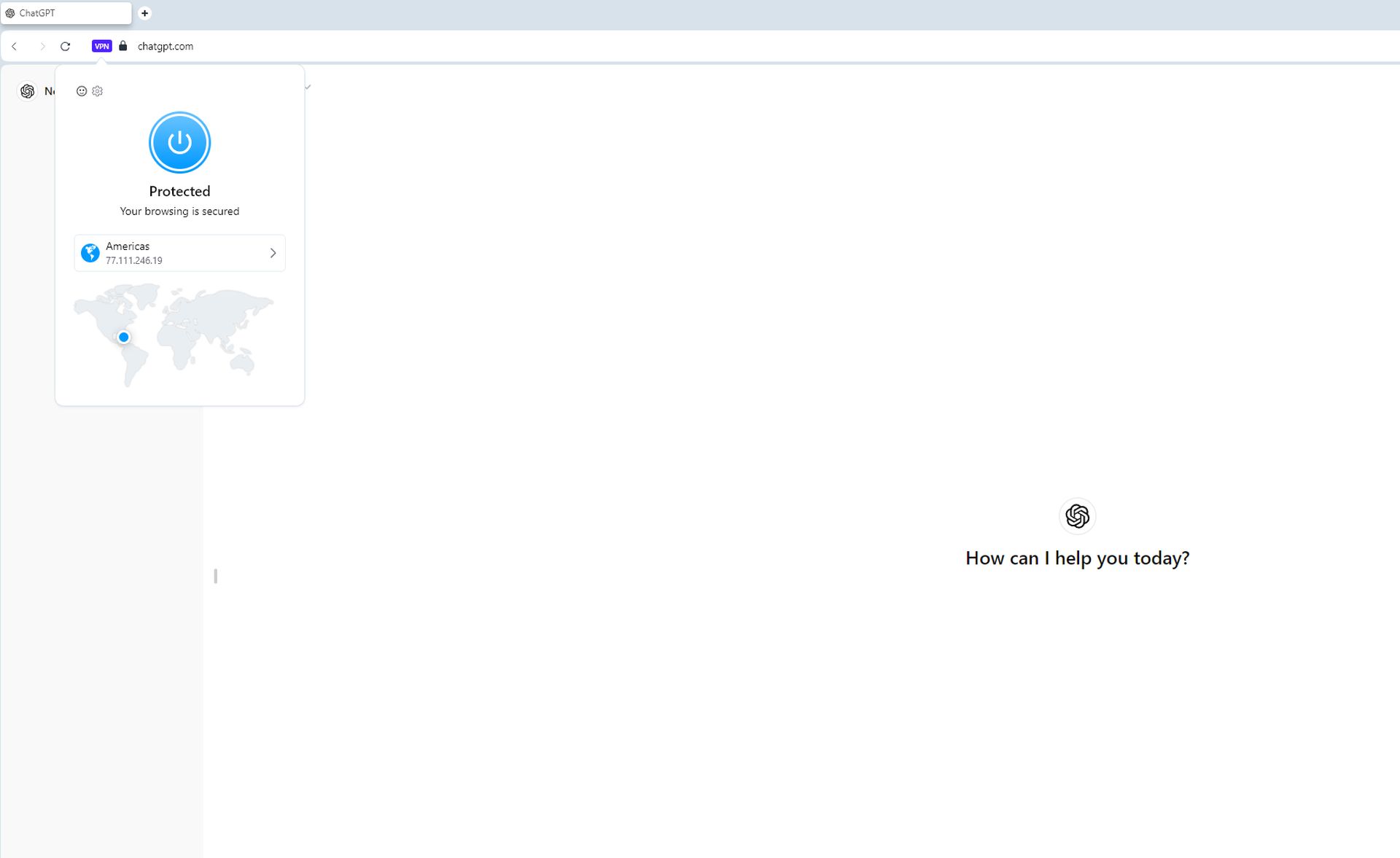
Upgrade to ChatGPT Plus
If slow responses become a frequent issue, consider upgrading to ChatGPT Plus. This premium service offers early access to new features and faster processing speeds, enhancing your overall experience.
For instance, it took 7.5 seconds for ChatGPT to deliver the answer below. For a faster and more efficient experience, consider upgrading to ChatGPT Plus:
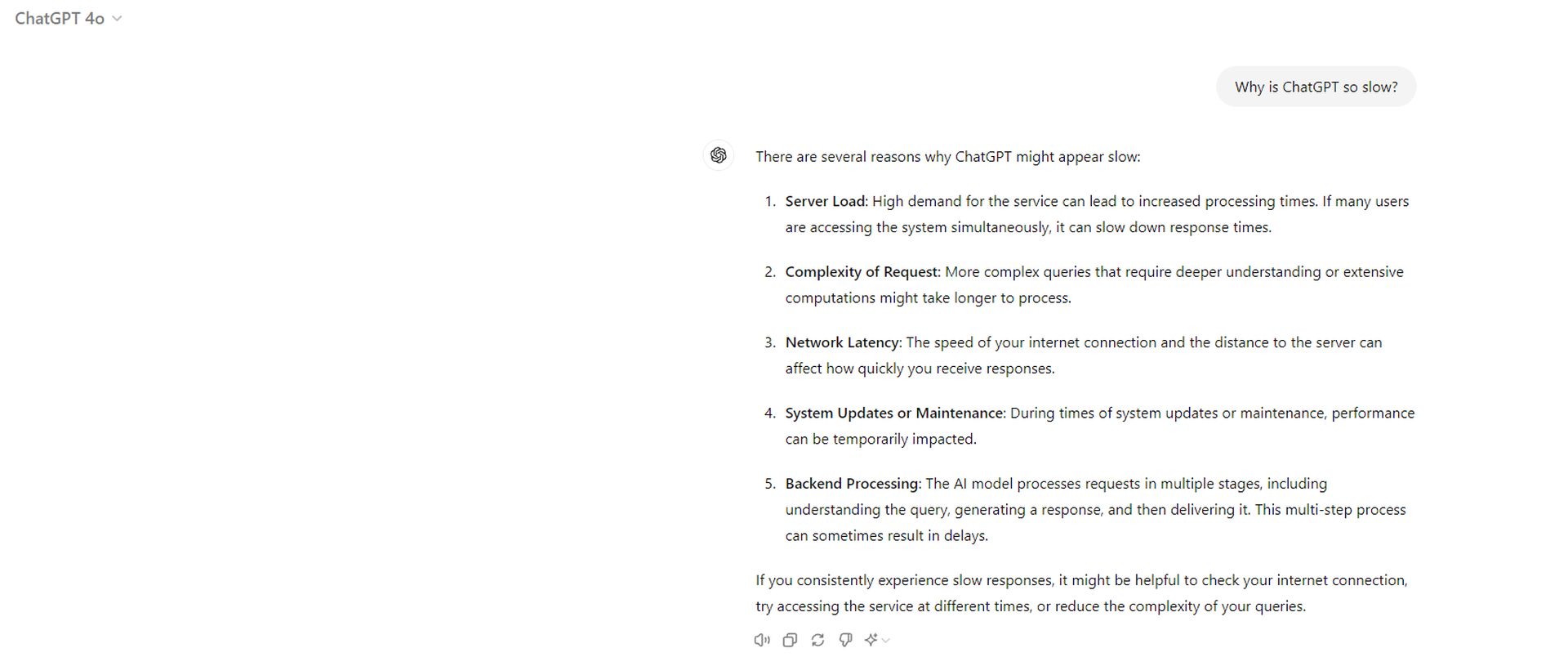
Use alternatives
If ChatGPT feels slow for your needs, consider exploring these top alternatives:
- Google Gemini: Known for its speed and integration with Google’s extensive data resources, Bard offers rapid responses and a user-friendly interface.
- Microsoft Bing Chat: Integrated with Microsoft’s suite of tools, Bing Chat provides quick and accurate answers, especially for professional and technical queries.
- Claude by Anthropic: Claude focuses on providing safe and reliable answers quickly, making it a great option for users looking for fast and secure interactions.
- Jasper AI: Tailored for content creation and marketing, Jasper AI offers swift and high-quality content generation, perfect for business applications.
Final words
Sometimes, it’s not you—it’s the service itself. With the release of GPT-4o, the platform is continually improving and evolving, leading to enhanced capabilities and more sophisticated interactions. However, as with any advanced technology, there can be occasional glitches and periods of slower performance. These temporary issues are part of the growing pains of integrating cutting-edge advancements. Rest assured, the team behind ChatGPT is constantly working on refining the system, and the experience is getting better every day. Your patience and understanding during these times contribute to the ongoing improvement and reliability of the service.
Featured image credit: Kerem Gülen/Midjourney





